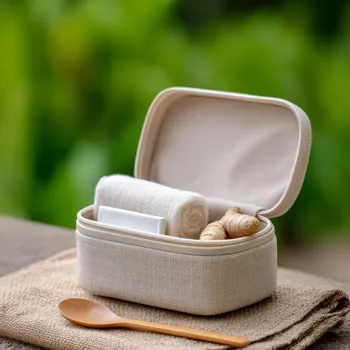Discover 7 ways to reduce waste and travel sustainably on your next trip. Make a positive impact on the environment
Namaste, globe-trotters! Are you planning your next adventure? That’s fantastic! But before
you pack your bags and get ready to explore, let's talk about something super important: sustainable travel. Traveling is a wonderful experience, but it can also create a lot of waste.

Think about all the plastic water bottles, disposable food containers, and single-use toiletries that pile up during a trip. It's time to travel responsibly! So, how can we minimize our environmental impact while still enjoying the wonders of our beautiful planet?
Don't worry, it's easier than you think. Here are seven simple yet effective ways to reduce waste on your next holiday, making it a more environmentally friendly and fulfilling experience. Get ready to explore the world with a lighter footprint!
BYOB (Bring Your Own Bottle):
Yes, you heard that right! Let’s start with the basics. Plastic water bottles are a major source of pollution, clogging landfills and polluting our oceans. Investing in a reusable water bottle is a simple but impactful way to reduce your contribution to this problem.

Carry it with you wherever you go, and refill it whenever possible. Most airports, railway stations, and even tourist attractions now have water refill stations. Plus, many cafes and restaurants are happy to refill your bottle if you ask nicely.
To make it even more convenient, consider getting a foldable water bottle that takes up minimal space in your luggage when empty. Similarly, think about carrying a reusable coffee mug or tumbler.
Those takeaway paper cups may seem harmless, but they often have a plastic lining that makes them difficult to recycle. A stylish reusable mug will not only reduce waste but also keep your chai or coffee hot for longer.
Look for locally made or quirky designs to add a bit of personality to your travel gear. It'll be your trusty companion from sunrise to sunset. When you are going on a trip you can purchase reusable water bottle to help reduce waste.
Say No to Single-Use Plastics:
Single-use plastics are everywhere, from straws and cutlery to shopping bags and food containers. Consciously avoiding these items can make a big difference. Pack a reusable shopping bag or two in your suitcase.
They're perfect for carrying souvenirs, groceries, or anything else you might pick up along the way. When ordering takeout or street food, politely decline any plastic cutlery offered and use your own reusable utensils.
You can find lightweight, portable cutlery sets made from bamboo or stainless steel, perfect for travel. Consider carrying your food in your own reusable container to avoid buying food in container. Avoid straws whenever possible, or invest in a reusable straw made from metal or bamboo.
If you're buying snacks or groceries, try to choose items with minimal packaging or opt for those packaged in paper or cardboard, which are more easily recyclable. Being mindful of your consumption habits and actively refusing single-use plastics will significantly reduce your waste footprint.
You can even encourage local vendors to adopt more sustainable practices. You can say no to single use plastics.
Pack Your Own Toiletries:
Hotel toiletries may seem convenient but contribute significantly to plastic waste. Those tiny shampoo bottles and soap bars often end up half-used and discarded. Instead, pack your own toiletries in reusable travel-sized containers.

You can find a wide range of eco-friendly travel containers online or at your local pharmacy. Choose solid shampoo and conditioner bars instead of liquid products. They take up less space, last longer, and eliminate the need for plastic bottles altogether.
Consider using natural and biodegradable toiletries that are gentle on your skin and the environment. Look for brands that use sustainable packaging and avoid harsh chemicals. Don’t forget essentials like sunscreen, insect repellent, and hand sanitizer.
Opt for travel-sized versions or transfer them into smaller reusable containers to minimize waste. Additionally, pack a reusable washcloth or loofah instead of disposable ones.
By being prepared and packing your own toiletries, you'll reduce waste and ensure you're using products that align with your values.
Choose Eco-Friendly Accommodation:
The accommodation you choose has a significant impact on your trip’s environmental footprint. Look for hotels, guesthouses, or homestays that prioritize sustainability.

Many establishments are now implementing eco-friendly practices such as energy conservation, water management, waste reduction, and responsible sourcing. Read reviews and check their websites for information about their sustainability initiatives. Do they use energy-efficient lighting?
Do they have water-saving devices in the bathrooms? Do they recycle and compost waste? Some accommodations go the extra mile by offering organic and locally sourced meals, supporting local communities, and promoting eco-tourism activities.
Consider staying in eco-lodges or homestays in rural areas, where you can experience nature firsthand and support local economies. Don't be afraid to ask questions about their sustainability practices before booking.
By choosing eco-friendly accommodations, you'll not only minimize your environmental impact but also support businesses that are committed to responsible tourism. You can even encourage other hotels to adopt sustainable practices by providing feedback and suggestions.
Embrace the Power of Reusables:
Beyond water bottles and shopping bags, there are many other reusables you can incorporate into your travel kit. Pack a reusable food wrap, made from beeswax or silicone, to keep snacks fresh without using plastic wrap. These wraps are washable, reusable, and biodegradable.
Carry a small reusable cloth napkin for wiping spills or cleaning your hands. It's more eco-friendly than using disposable paper napkins. Consider bringing a reusable snack bag or container for carrying fruits, nuts, or sandwiches.
These bags are washable, lightweight, and prevent food from getting crushed in your bag. If you wear contact lenses, bring your own lens solution in a reusable bottle instead of buying travel-sized disposable bottles.
Ladies, consider using a menstrual cup instead of disposable pads or tampons to reduce waste and save space in your luggage. Also think of embracing the reusable item to use on daily basis. It is a very good habit.
By making small swaps and incorporating reusables into your daily routine, you can significantly reduce waste on your travels.
Shop Local and Support Sustainable Businesses:
When buying souvenirs or gifts, opt for locally made products that support local artisans and businesses. Avoid mass-produced items made from cheap materials that are likely to end up in landfills.
Look for handicrafts, artwork, clothing and food items that are made using sustainable practices and materials. Support businesses that prioritize fair wages, ethical sourcing, and environmental responsibility.
Visit local markets and fairs to discover unique and authentic products and interact with the local community. Learn about the cultural significance of the items you're buying and support traditional crafts.
When purchasing food or drinks, choose local restaurants and cafes that use fresh, seasonal ingredients and support local farmers. Avoid chain restaurants and fast-food outlets that often use unsustainable practices.
By shopping local and supporting sustainable businesses, you stimulate the local economy, preserve cultural traditions, and reduce the environmental impact of your purchases. You can also encourage other tourists to support local businesses and make informed purchasing decisions.
Leave No Trace:
This is the golden rule of responsible travel. Wherever you go, make sure you leave the place as you found it, or even better. Dispose of waste responsibly by using designated trash bins or carrying your trash with you until you find a proper disposal facility.

Avoid littering, especially in natural environments like parks, beaches, and forests. If you're hiking or camping, pack out everything you pack in, including food wrappers, empty bottles, and any other waste. Respect wildlife by observing them from a distance and avoiding feeding them.
Stay on marked trails to avoid damaging vegetation or disturbing animal habitats. Be mindful of your water consumption, especially in areas where water is scarce. Turn off the tap when brushing your teeth and take shorter showers.
When using public transportation, choose eco-friendly options such as walking, cycling, or taking trains or buses instead of driving. By practicing “Leave No Trace” principles, you ensure that future generations can enjoy the beauty and wonder of the places you visit.
You also set a positive example for other travelers and contribute to the preservation of our planet.
So, there you have it – seven simple yet effective ways to reduce waste on your next trip.
By adopting these practices, you can travel more responsibly, minimize your environmental impact, and contribute to a more sustainable future for all. Remember, every small action counts, and together, we can make a big difference. Happy travels, and safe journey!













